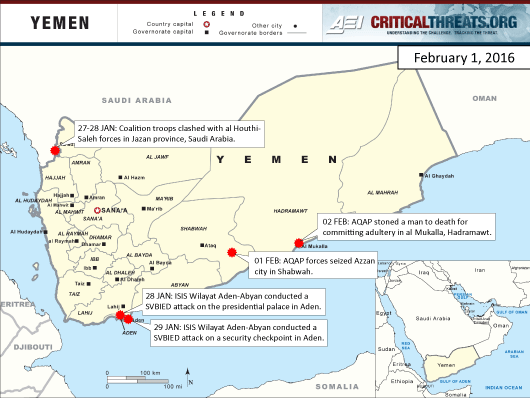Al Qaeda in the Arabian Peninsula (AQAP) now controls the territory it held in 2011 and territory it seized in early 2015. It also is enforcing shari'a in al Mukalla, Hadramawt. Meanwhile, the Islamic State in Iraq and al Sham (ISIS) in Yemen may be looking to reassert itself after two months of limited activity.
AQAP is reconstituting control over the cities within the “emirate” it held in 2011-2012. AQAP militants seized control of Azzan city in Shabwah on February 1 after the withdrawal of local tribal militias. Militants set up checkpoints controlling access to the city and occupied the local government buildings. AQAP controlled Azzan in 2011, but ceded control in June 2012 to Yemeni military forces. Azzan sits atop one of Yemen’s primary trans-national roads, making it an important trading crossroads for Shabwah, Abyan, and Hadramawt. AQAP controls the major cities along the route: al Mukalla, Azzan, and Zinjibar. AQAP may also be operating from al Hawta, north of Aden, as of January 25. AQAP now effectively controls the primary road from Abyan through Hadramawt and operates openly in Abyan, parts of al Bayda and Shabwah, and Hadramawt.
AQAP continues to enforce extreme shari'a in al Mukalla, Hadramawt, conducting a second stoning as punishment. AQAP publicly stoned a man to death for adultery in al Mukalla on February 1. AQAP stoned a woman to death for the same crime in early January, the first use of such a punishment during AQAP’s control of al Mukalla. A large crowd attended this most recent stoning, and an Ansar al Sharia-linked Twitter account published photos of the event. AQAP prohibited photography during the January execution. Stonings are extremely rare in Yemen.
ISIS resumed its anti-coalition campaign in Aden and may also be recruiting foreign fighters to support activity in Yemen. ISIS Wilayat Aden-Abyan conducted its first attack since December 6, 2015. ISIS deployed a suicide vehicle-borne improvised explosive device (SVBIED) against the Aden presidential palace on January 28. The attack targeted Yemeni President Abdu Rabbu Mansour Hadi, who has intermittently travelled to Aden from exile in Riyadh, Saudi Arabia over the past year. The bomber was Dutch, making him the first known foreign ISIS suicide bomber in Yemen and possibly indicating that ISIS has foreign recruits operating in the country. ISIS Wilayat Aden-Abyan orchestrated a second SVBIED attack on a security checkpoint in Aden on January 29. ISIS in Yemen’s activity noticeably dropped in late 2015 after the emergence of well-publicized discord within the group over the leadership in Yemen. (Translation available by subscription through SITE.)
A unit loyal to Ali Abdullah Saleh may have defected in Sana'a governorate. An al Houthi Republican Guard detachment of approximately 50 reportedly defected to the coalition-supported popular resistance in Nihm district, Sana’a. The Republican Guard, disbanded during security sector restructuring in Yemen after 2011, is composed of Saleh loyalists and is stationed in and around Sana’a city.
The Saudi-led coalition is doubling down on contesting the al Houthis and securing Aden. The coalition will continue to prioritize efforts against the al Houthi-Saleh movement over countering AQAP to advance the coalition’s objective of establishing a friendly government in Sana’a. Coalition troops clashed with al Houthi forces along the Saudi Arabian-Yemeni border on January 27 and 28 as part of an effort to repulse al Houthi border attacks, which a Saudi spokesman says have killed 375 Saudi civilians since March 2015. The coalition’s air campaign carried on in earnest, hitting dozens of al Houthi targets from January 27 through February 1. Coalition-backed troops also reinforced positions against al Houthi-Saleh forces in al Jawf and Taiz city. The coalition continues efforts to secure its foothold in Aden; a large contingent of Emirati reinforcements arrived in Aden on January 27, two days after Yemeni Prime Minister Khaled Bahah and his cabinet returned to the city.
AQAP will continue to consolidate control and expand into new areas in Yemen without resistance from the coalition or the al Houthi-Saleh movement. ISIS maintains a footprint in Yemen and its attacks in Aden will further destabilize the situation.

